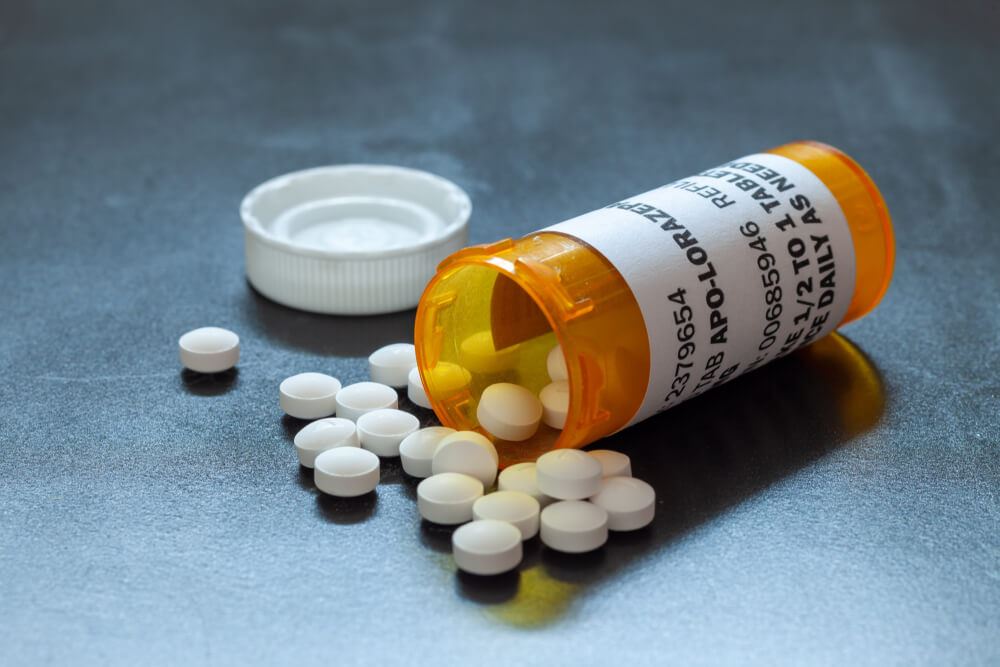If you’ve developed an addiction to benzodiazepines, it’s not your fault. However, it is your responsibility to get treatment. Don’t let an addiction to benzos take over your life. Instead, contact our compassionate team at Tranquil Shores anytime, day or night (including holidays).

![meritain-health-logo-vector[3]](https://www.tranquilshores.org/wp-content/uploads/2022/10/meritain-health-logo-vector3.png)

![blue-cross-blue-shield-1-logo-png-transparent[2]](https://www.tranquilshores.org/wp-content/uploads/2022/10/blue-cross-blue-shield-1-logo-png-transparent2.png)






Benzodiazepine Rehab In Florida
Get Treatment for Benzodiazepine Addiction at Tranquil Shores
Benzodiazepines (BZDs or “benzos”) have plenty of legitimate medical uses, but they can also be deeply addictive. While the drugs are effective in treating anxiety and other conditions, they also create a hypnotic sedative effect that many people seek out time and time again. When this drug-seeking behavior becomes compulsive and starts interfering with someone’s everyday life, it is referred to as addiction or substance use disorder.
If you or a loved one is struggling with an addiction to benzodiazepine medications, Tranquil Shores can help. We focus on helping you succeed as a whole person, and we build your treatment plan around your unique needs. We will use the strategies that work for you, so you can maintain lifelong sobriety.
We can help you get better. All you have to do is call us at (727) 391-7001 today to learn more about our Florida benzodiazepine rehab program.
On This Page:
- What Are Benzodiazepines?
- How Do Benzos Work?
- Risk Factors for Benzo Addiction
- Signs and Symptoms of Benzo Addiction
- How Is Benzo Addiction Treated?
- How to Help Someone Addicted to Benzodiazepines
- Why Seek Treatment at Tranquil Shores?
What Are Benzodiazepines?
Benzodiazepines are some of the most prescribed drugs in America, and the problem is getting worse. From 2003 to 2015, the percentage of outpatient medical visits leading to the prescription of a benzodiazepine doubled, and about half of the prescriptions were written by primary care doctors. This drug class includes medications you’ve almost certainly heard of, such as:
- Alprazolam (Xanax®)
- Clonazepam (Klonopin®)
- Lorazepam (Ativan®)
- Chlorazepoxide (Librium®)
- Diazepam (Valium®)
Benzodiazepines are prescribed to treat anxiety, panic, and issues with sleeping like insomnia. They can also be used to treat seizures. This drug class comes with many side effects, the most common of which are:
- Sedation
- Weakness
- Dizziness
- Unsteadiness
If someone chronically abuses or is addicted to benzodiazepines, the symptom list gets longer and more severe, with side effects like:
- Feelings of depression
- Headaches
- Confusion
- Impaired memory
- Poor judgment
- Loss of orientation
- Disturbed sleep
- Irritability and aggression
- Unusual, erratic mannerisms
When these signs occur in conjunction with any of the DSM-5 criteria, the individual is abusing medications and is well on the way to a debilitating addiction. By the time most people have realized the disturbing effects of long-term use, they are already addicted.
How Do Benzos Work?
Benzodiazepines are a class of psychoactive drugs made from the chemicals benzene and diazepine. Benzos work by enhancing the effects of the GABA-A neurotransmitter in your brain, thus producing a sedative, hypnotic effect that calms the nervous system. This effect reduces activity in areas of the brain responsible for rational thought, memory, and emotions — but also the areas that control essential functions like breathing.
This effect can be helpful in treating conditions like anxiety, insomnia, muscle spasms, and even seizures, but when people seek this feeling outside of their treatment, drug abuse, and addiction can occur.
Risk Factors for Benzo Addiction
Behaviors that increase the risk of benzodiazepine addiction include:
- Long-term use of benzos (beyond 4 weeks)
- High doses of benzodiazepines
- Using benzos with barbiturates or alcohol
- Suffering from anxiety or other mental health conditions
If you find yourself taking more and more benzos or experiencing withdrawal symptoms when you stop, you may be suffering from benzodiazepine addiction. Call Tranquil Shores for treatment.
What Are the Signs and Symptoms of Benzodiazepine Addiction?
Over time, your body and mind can become dependent on benzodiazepines. This means you may need the medication to function. Dependence often leads to addiction, but not everyone with a benzodiazepine dependency develops a benzodiazepine addiction.
The signs and symptoms of benzodiazepine addiction include:
- Failure or inability to cut back or quit using benzos
- Feeling unable to function without benzos
- Needing larger doses to feel the effects of benzos
- Experiencing withdrawal symptoms when you stop using benzos
Withdrawal symptoms include anxiety, depression, hypersensitivity, depersonalization, physical tremors, sleep disturbances, and rarely, psychosis and convulsions. Some people who struggle with benzodiazepine addiction also self-harm and think about or attempt suicide.
Many times, friends and family members notice a benzo problem before the person struggling does. If you’re worried about someone you love, look out for:
- Relationship problems
- Legal issues
- Multiple prescriptions
- Decreased productivity and motivation
- Unfulfilled responsibilities
- Isolation
- Continued drug use despite negative consequences

Intervention Strategies for Athletes
Sometimes, an intervention is needed to make an impact on a loved one who is struggling with addiction. You might want to hold an intervention for a loved one if they previously have refused to get help or continue to use drugs despite efforts to make them stop. It might also be the best way to show a loved one that you believe in them and that there is hope, even if they’ve tried to stop drug use in the past.
An intervention is carefully planned by friends, family and a doctor or other health professional. For an intervention to be effective, all the details must be considered first. Here are tips to keep in mind for a productive intervention:
- Plan the intervention with those you wish to have involved.
- Do not tell the addicted individual about your plan.
- Prepare for the intervention by making notes of specific examples of destructive behavior.
- Decide the consequences you will present if the addicted loved one chooses not to get treatment.
- Make sure you can follow through with the consequences.
- Hold the intervention when the loved one is not on the drug or busy with other plans.
- Make sure to consult a professional for help.
Are you or someone you care for struggling with benzodiazepine addiction? Our team can help. Click here for more information about admissions.
How Is Benzo Addiction Treated?
Addiction is a disease, and it can be managed with the appropriate treatment. Most benzodiazepine addiction treatments begin with detox. When you detox at Tranquil Shores, our team of clinical experts helps you get benzos out of your system slowly and safely while mitigating withdrawal symptoms.
Afterward, we focus on your holistic wellbeing and help you get to the bottom of your substance use disorder. Once we’ve addressed all aspects of your physical and mental health, we will teach you the skills and strategies you need to maintain sobriety and help you transition back to everyday life.
Our benzodiazepine addiction treatment programs involve a combination of traditional and holistic therapies, including:
We offer treatment to people from all walks of life, including athletes, artists, and business executives.
How to Help Someone Addicted to Benzodiazepines
There are few things more tragic than witnessing someone you care about struggle with a benzo addiction. While it may be awkward, uncomfortable, and even downright painful to approach someone you love about their drug use, it is critical that you voice your concerns and let them know you care. Your words could potentially save their life!
If your parent, son, daughter, spouse, or other loved one is in need of benzo rehab, there are several things you can do to get them the help they need:
- Do your homework and learn as much as you can about benzo addiction before you speak to them. This will help you better understand what they are going through. Remember that they are suffering from a disease, not merely a failure of willpower.
- When the time is right, approach them with a compassionate tone and mindset. Express your concerns plainly and calmly, but avoid judging or shaming them for their struggles.
- Understand that they may react with negative emotions, including denial and anger. Be prepared for this possibility, but do not get discouraged. If they do not agree to seek help the first time around, try again. Remember, you cannot force someone to seek treatment. They must make this decision for themselves.
- If they refuse to acknowledge an obvious benzo addiction after multiple confrontations, consider staging an intervention with the help of a licensed professional.
- If they agree to seek treatment, stay involved in their recovery and check in with them regularly. Continue to be a steady support for them throughout all stages of their recovery journey.
Why Now? Why Tranquil Shores?
Left untreated, benzodiazepine addiction can be fatal. Signs of benzodiazepine overdose include shallow respiration, clammy skin, dilated pupils, weak and rapid pulse, and coma. Benzodiazepines are especially dangerous when used with alcohol or opioids. If you or someone you love is addicted to benzodiazepines, don’t wait to see how their addiction plays out; treatment could be the difference between life and death.
Instead of waiting, call Tranquil Shores today. Our private, 24-bed facility is located in Florida, right next to the beach, and our small barrier island on the Gulf of Mexico provides a safe, calm, and peaceful place for recovery. Our compassionate staff will help you through the hardest parts of addiction treatment, and our 3 to 1 client to counselor ratio ensures you get the personalized attention you need and deserve.
Call us at (727) 391-7001 or contact us online to get started.
Famous Athletes With Mental Illness
How to Prevent Drug Abuse and Addiction in Sports
Many times, teens and children look to their favorite athletes as inspiration. Celebrities set examples for the youth, and the power they have can be positive, but it can also have negative effects. For example, four out of 10 teens who took steroids claim they did so because pro athletes who also took steroids inspired them.
It does not help that 85 percent of teen sports players also say they do not have information about the side effects of steroid use.
In this section, we will show you what you can do to make a difference, starting with educating youth about the dangers of steroid abuse.
1. Educate
Educate your children or peers about the harmful side effects of both short-term and long-term steroid abuse. Also, explain that doping is cheating, and let athletes know that you expect them not to use drugs.
Also explain the consequences of drug use, such as a suspension which could lead to a scholarship loss. Make sure athletes understand all the social, physical and mental consequences of steroid abuse. Finally, tell them the signs to look out for so they can help a friend who may be struggling with steroid abuse and spread their knowledge to others.
2. Advocate
Regularly discuss healthy ways to achieve athletic goals such as through training and diet. Encourage athletes to be their best, not only as an athlete but also as an ethical player. Speak with coaches about maintaining a zero-tolerance policy.
Although it is tough to say which athletes have or have not used performance-enhancing drugs since many do not report use, you might also try using examples of talented and successful athletes who reportedly never used steroids or other banned performance-enhancing drugs.
Show others that drugs are not needed to succeed, and the risks are not worth losing everything they worked so hard for. Some examples of famous steroid-free athletes include NFL player Michael Ray Garvin, NBA star LeBron James and WWE pro Bobby Lashley.
3. Communicate
If your loved one does not perform at their best, show your support, remind them of a time they did well and let them know that such experiences are valuable learning lessons. Also, make it clear that you expect them not to turn to performance-enhancing drugs, and remind them of the dangers. Monitor any over-the-counter supplement use.
Speak with their coach regularly and always look out for any signs of drug abuse. Encourage your loved one to share their concerns with you and let them know you will always be there for them. If there are ways you can help them train and overcome any challenges, offer your knowledge and support.
Get Help for Addiction Today
Being an athlete takes skill, talent and determination. Many people wish they had what it takes to compete in sports, but not everyone is cut out for the challenge. If you or a loved one are an athlete, there are plenty of reasons to feel proud and continue doing what you love.
Do not let addiction or drug abuse stand in your way. Participating in sports demands physical and emotional strength. Drugs or alcohol may seem like a solution when you need to boost performance or recover from an injury, but the rewards are short-lived.
If you are struggling with addiction, whether it is from a drive to succeed or the stress of competition, know that there is hope for you. You can get your life and your health back, and be the athlete you have always wanted to be without the need for drugs or alcohol.
Take the first step at Tranquil Shores. Tranquil Shores is a private drug and alcohol rehab center in Florida. At Tranquil Shores, we offer individualized treatment plans to address the cause of your addiction and help you reclaim your life.
To learn more about our treatment programs, call (727) 391-7001, or fill out our admissions application to get started today.





